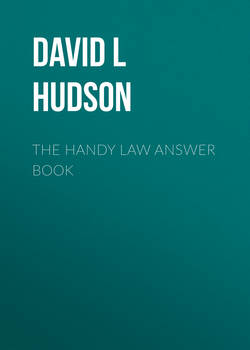Читать книгу The Handy Law Answer Book - David L Hudson - Страница 146
На сайте Литреса книга снята с продажи.
Is the death penalty considered cruel and unusual?
ОглавлениеCurrently, the death penalty per se is not considered cruel and unusual. Approximately 38 states still have the death penalty as an option in their criminal codes. The U.S. Supreme Court in Furman v. Georgia (1972; see LegalSpeak, p. 74) ruled 5 to 4 that Georgia’s death penalty statute did violate the Eighth Amendment. That ruling led to the invalidation of the death penalty nationwide for four years until the Court in Gregg v. Georgia (1976; see LegalSpeak, p. 78) upheld some more narrowly drafted death penalty statutes.
Since 1976, the Court has never invalidated the death penalty on its face. Instead, it has prohibited application of the death penalty to certain types of defendants, including those who are insane in Ford v. Wainwright (1986), those who are mentally retarded in Atkins v. Virginia (2002), those who were juveniles when they committed murder in Roper v. Simmons (2005), those who are rapists in Coker v. Georgia (1977), and child rapists when the rapes do not result in murder as in Kennedy v. Louisiana (2008).
LegalSpeak: Furman v. Georgia (1972)
All nine justices wrote separately in Furman v. Georgia. Five justices voted to invalidate the death penalty, while four justices voted to uphold it. Below are selections from each justice’s opinion.
Justice William Douglas (majority): “Thus, these discretionary statutes are unconstitutional in their operation. They are pregnant with discrimination and discrimination is an ingredient not compatible with the idea of equal protection of the laws that is implicit in the ban on ‘cruel and unusual’ punishments.”
Justice William Brennan (majority): “Death is truly an awesome punishment. The calculated killing of a human being by the State involves, by its very nature, a denial of the executed person’s humanity.”
Justice Potter Stewart (majority): “These death sentences are cruel and unusual in the same way that being struck by lightning is cruel and unusual.”
Justice Byron White (majority): “That conclusion, as I have said, is that the death penalty is exacted with great infrequency even for the most atrocious crimes and that there is no meaningful basis for distinguishing the few cases in which it is imposed from the many cases in which it is not.”
Justice Thurgood Marshall (majority): “There is but one conclusion that can be drawn from all of this—i.e., the death penalty is an excessive and unnecessary punishment that violates the Eighth Amendment. The statistical evidence is not convincing beyond all doubt, but it is persuasive…. In addition, even if capital punishment is not excessive, it nonetheless violates the Eighth Amendment because it is morally unacceptable to the people of the United States at this time in their history.”
Chief Justice Warren Burger (dissenting): “In the 181 years since the enactment of the Eighth Amendment, not a single decision of this Court has cast the slightest shadow of a doubt on the constitutionality of capital punishment. In rejecting Eighth Amendment attacks on particular modes of execution, the Court has more than once implicitly denied that capital punishment is impermissibly ‘cruel’ in the constitutional sense.”
Justice Harry Blackmun (dissenting): “Although personally I may rejoice at the Court’s result, I find it difficult to accept or to justify as a matter of history, of law, or of constitutional pronouncement. I fear the Court has overstepped. It has sought and has achieved an end.”
Justice Lewis Powell (dissenting): “In terms of the constitutional role of this Court, the impact of the majority’s ruling is all the greater because the decision encroaches upon an area squarely within the historic prerogative of the legislative branch—both state and federal—to protect the citizenry through the designation of penalties for prohibitable conduct. It is the very sort of judgment that the legislative branch is competent to make and for which the judiciary is ill-equipped.
Justice William Rehnquist (dissenting): “The task of judging constitutional cases imposed by Art. III cannot for this reason be avoided, but it must surely be approached with the deepest humility and genuine deference to legislative judgment. Today’s decision to invalidate capital punishment is, I respectfully submit, significantly lacking in those attributes.”
